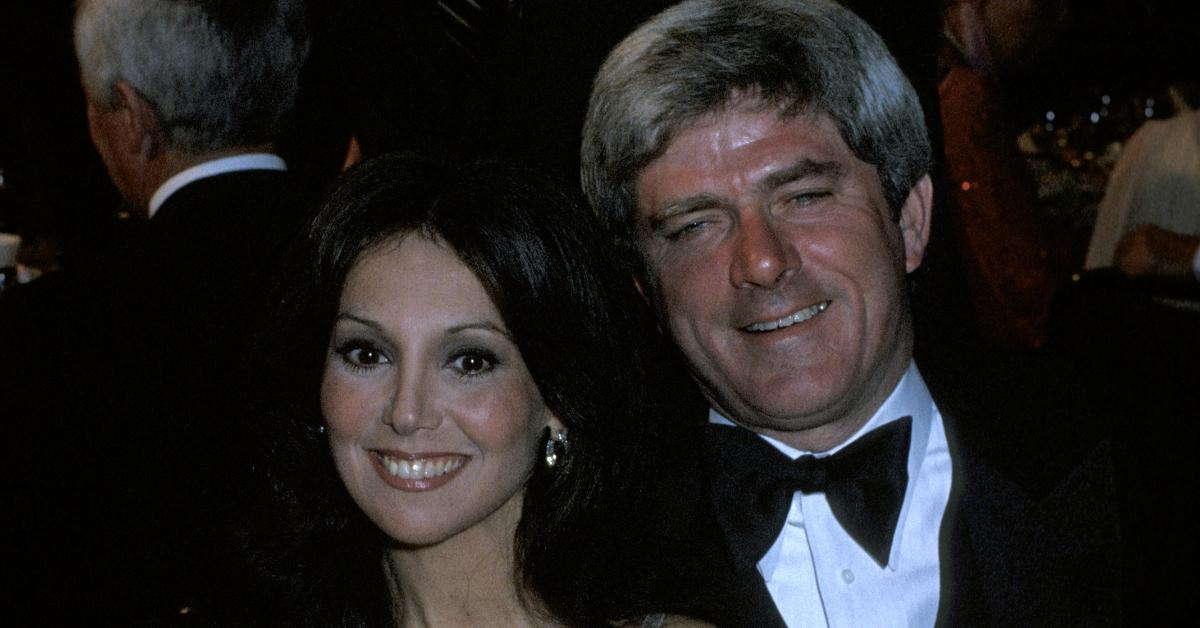Phil Donahue’s battle with Alzheimer’s has touched millions around the globe, bringing much-needed attention to a disease that impacts countless families. As one of America’s most iconic talk show hosts, Donahue’s personal struggle isn’t just his own—it’s an opportunity to educate, inspire, and connect with others. His willingness to share his diagnosis openly has sparked conversations about the challenges faced by those living with Alzheimer’s and the importance of support systems.
Alzheimer’s disease is a progressive neurological disorder that affects memory, thinking, and behavior. It’s the leading cause of dementia among older adults, and its effects ripple far beyond the individual diagnosed. Phil Donahue, whose name is synonymous with groundbreaking television, has become a powerful voice for those impacted by this devastating condition. His story reminds us that even legends face human struggles—and that together, we can make a difference.
This article dives deep into Phil Donahue’s life, his diagnosis, and the broader implications of Alzheimer’s disease. By exploring his journey, we aim to provide valuable insights into the challenges faced by individuals and families dealing with this condition. Let’s come together to foster understanding, empathy, and support for those affected.
Read also:Jim Parsons The Remarkable Journey Of A Beloved Actor
Table of Contents
- Biography of Phil Donahue
- Early Life and Career
- Phil Donahue's Alzheimer's Diagnosis
- Recognizing the Symptoms of Alzheimer's
- Understanding the Causes of Alzheimer's
- Current Treatments for Alzheimer's
- Phil Donahue's Impact on Alzheimer's Awareness
- Building a Strong Support System
- Ongoing Research in Alzheimer's
- Conclusion and Call to Action
The Life and Legacy of Phil Donahue
Phil Donahue, born on December 21, 1935, in Cleveland, Ohio, is a towering figure in the world of television. Known for his groundbreaking talk show, "The Phil Donahue Show," he revolutionized the genre by tackling controversial and taboo topics with honesty, empathy, and courage. Beyond being an entertainer, Donahue became a force for change, influencing public discourse on everything from politics to social justice. His work laid the foundation for modern talk shows and inspired generations of hosts.
Early Life and Key Milestones
Here’s a quick look at Phil Donahue’s early life and key achievements:
| Category | Details |
|---|---|
| Full Name | Philip Joseph Donahue III |
| Birth Date | December 21, 1935 |
| Birthplace | Cleveland, Ohio, USA |
| Education | Bachelor's degree in English from the University of Notre Dame |
| Profession | Talk Show Host, Author, and Activist |
| Notable Achievements | First daytime talk show to discuss topics like abortion and gay rights |
From Humble Beginnings to Television Legend
Phil Donahue’s journey started in modest circumstances. Growing up in Ohio, he developed a passion for storytelling and communication early on. After earning a degree in English from the University of Notre Dame, he embarked on a career in journalism. His big break came in 1967 when he launched "The Phil Donahue Show," which quickly gained national acclaim for its innovative format and thought-provoking content.
Over the decades, Donahue’s career flourished as he interviewed countless celebrities, politicians, and activists. His unique ability to connect with diverse audiences earned him numerous awards and accolades, cementing his legacy in television history. But beyond the screen, Donahue’s impact extended into the lives of millions, sparking important conversations and inspiring change.
A Personal Revelation: Phil Donahue’s Alzheimer’s Diagnosis
In 2019, Phil Donahue made headlines when he announced his diagnosis with Alzheimer’s disease. This was both a deeply personal moment and a public one, as Donahue chose to share his struggles openly with the world. His decision to go public wasn’t just about transparency—it was about reducing the stigma surrounding Alzheimer’s and encouraging others to seek help early.
Key Insights from His Announcement
- Donahue’s diagnosis came after experiencing memory lapses and cognitive difficulties, prompting medical evaluation.
- He emphasized the importance of early detection and intervention, stressing that catching the disease early can make a real difference in managing it.
- His message of hope and resilience struck a chord with millions of people who face similar challenges, reminding them they’re not alone.
Spotting the Signs: Recognizing the Symptoms of Alzheimer’s
Understanding the symptoms of Alzheimer’s is crucial for early detection and effective management. Some common signs include memory loss, difficulty solving problems, confusion about time or place, and noticeable changes in mood or behavior. Identifying these symptoms early can lead to timely medical intervention and access to critical support systems.
Read also:Thandie Newton The Iconic Star Who Defines Modern Hollywood
The Alzheimer’s Association stresses that early diagnosis can significantly improve the quality of life for patients and their families. By recognizing warning signs early, individuals can tap into valuable resources and treatments that may slow the progression of the disease, giving them more time to live fully and plan for the future.
Unpacking the Puzzle: Understanding the Causes of Alzheimer’s
While the exact cause of Alzheimer’s remains elusive, researchers have identified several risk factors that contribute to its development. Age, genetics, and lifestyle choices all play a role in determining one’s susceptibility to the disease. Studies suggest that maintaining a healthy lifestyle—regular exercise, a balanced diet, and mental stimulation—can help reduce the risk of Alzheimer’s.
Key Risk Factors
- Age: The risk of Alzheimer’s increases dramatically after the age of 65, making it a condition often associated with aging.
- Family History: Those with a family history of Alzheimer’s are at a higher risk, underscoring the genetic component of the disease.
- Heart Health: Poor cardiovascular health has been linked to an increased risk of dementia, highlighting the interconnectedness of our body systems.
Managing the Unseen Battle: Current Treatments for Alzheimer’s
While there is currently no cure for Alzheimer’s, treatments exist to manage symptoms and improve quality of life. Medications such as cholinesterase inhibitors and memantine are commonly prescribed to help maintain cognitive function. Beyond medication, therapies like cognitive training and behavioral interventions offer additional support, helping patients navigate the challenges of the disease.
Exciting advancements in research bring hope for the future. Scientists are exploring cutting-edge treatments, including immunotherapy and gene therapy, in their quest to combat Alzheimer’s. Continued investment in research is essential to uncovering new solutions and ultimately finding a cure.
A Beacon of Hope: Phil Donahue’s Impact on Alzheimer’s Awareness
Phil Donahue’s decision to speak openly about his diagnosis has had a profound impact on Alzheimer’s awareness. By sharing his story, he has inspired countless individuals to seek help and support. His advocacy efforts have emphasized the importance of education, research, and community support in addressing the challenges posed by Alzheimer’s.
Donahue’s Advocacy Work
- Donahue has partnered with organizations to raise funds for Alzheimer’s research, leveraging his platform to drive meaningful change.
- He uses his voice to educate the public about the disease and its effects, helping to demystify what can be a daunting diagnosis.
- His personal journey serves as a testament to the resilience and strength of those living with Alzheimer’s, proving that even in the face of adversity, hope endures.
Standing Together: Building a Strong Support System
For individuals and families affected by Alzheimer’s, building a robust support system is essential. This includes seeking professional care, connecting with support groups, and fostering open communication among family members. Caregivers play a vital role in managing the challenges of the disease, and their well-being must be prioritized.
Tips for Caregivers
- Seek professional guidance and resources to better manage caregiving responsibilities and avoid burnout.
- Join support groups to connect with others facing similar challenges, creating a network of understanding and encouragement.
- Prioritize self-care to maintain physical and emotional health, recognizing that caring for yourself is just as important as caring for your loved one.
Paving the Way Forward: Ongoing Research in Alzheimer’s
Research into Alzheimer’s disease is advancing rapidly, with scientists exploring new avenues for prevention and treatment. Recent studies have focused on identifying biomarkers for early detection, developing targeted therapies, and unraveling the genetic components of the disease. These breakthroughs offer hope for improved outcomes for those affected by Alzheimer’s.
Collaboration between researchers, healthcare providers, and advocacy groups is crucial to accelerating progress. By investing in research and fostering innovation, we can work toward a future where Alzheimer’s is no longer a looming threat but a challenge we’ve overcome together.
A Call to Action: Let’s Make a Difference
Phil Donahue’s journey with Alzheimer’s underscores the importance of awareness, education, and support for those affected by the disease. His legacy extends far beyond his contributions to television, inspiring countless individuals to face challenges with courage and grace. By understanding the symptoms, causes, and treatments of Alzheimer’s, we can better support those who need it most.
We invite you to take action by sharing this article, joining support groups, and advocating for increased funding for Alzheimer’s research. Together, we can create a brighter future for the millions impacted by this condition. Thank you for reading, and please feel free to leave a comment or explore other articles on our site. Together, let’s keep the conversation going.


